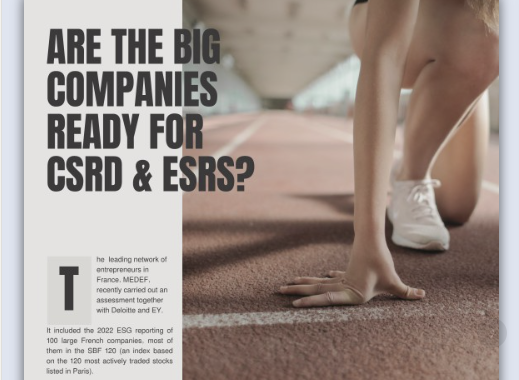A recent assessment of 100 large companies in France, shows that the road is bumpy and that there is still a lot of work to do:
➡ 83% of the assessed companies present a materiality analysis, but only 14% publish a “double materiality” analysis following the requirements as defined by ESRS 1.
➡ 73% have defined decarbonization objectives validated by the SBTi, but only 17% detail the different decarbonization levers allowing them to achieve their objectives, as required by ESRS E1.
➡ Not even half of the companies publish (or declare that they take into account) the analysis of at least one climate scenario and quantify their climate risks – and 4 out of 5 do not include climate transition risks.
➡ Less than 10% have defined pollution objectives, only 31% publish water consumption reduction targets and only 13% declare the number of production sites located in or near sensitive areas in terms of biodiversity.
➡ Only 30% have formalized objectives related to the circularity of products and their packaging but 51% declare waste management objectives.
➡ 53% publish indicators related to the gender pay gap of their employees at group level, but only 8% provide information to compare low wages to decent wages.
The carbon tunnel vision is not helpful
This assessment of large companies in France, shows what we all already suspected: there is a long way to go – both to grasp the holistic vision of the ESRS framework, and to get organized around these reporting requirements.
Many still think that CSRD is mostly about reporting on GHG emissions, and this carbon tunnel vision is not helpful.
Reducing emissions remains a key challenge, but the fact is that even in the ESRS E1 Climate change standard less than 20% of the disclosure points are about reporting on emissions.
Strategy, governance, processes, climate change resilience, and climate-related impacts, risks & opportunities are very much in focus. It is as much about preparing for a different future, and future-proof our businesses, as it is about mitigating climate change.
A game-changer for corporate accountability
CSRD and ESRS are a game-changer for corporate accountability, in the EU and globally. It is not just about a report to fill in, it’s a new way of governing that will take several months – even years – to prepare.
The best time to get started was yesterday. The next best time is today.
With ESRS the devil is in the detail
Step one is understanding – in detail – what will be expected.
This can be done by navigating and learning the standards – every single disclosure point (approx. 990 in ESRS, whereof approx. 250 metrics, subject to materiality assessment).
The CSRD-compliant and ESRS-ready Sustainability Strategy, Governance & Reporting SaaS solution Cleerit ESG – with every single disclosure point digitized – helps you navigate the standards, learn and prepare – to get CSRD-ready.
